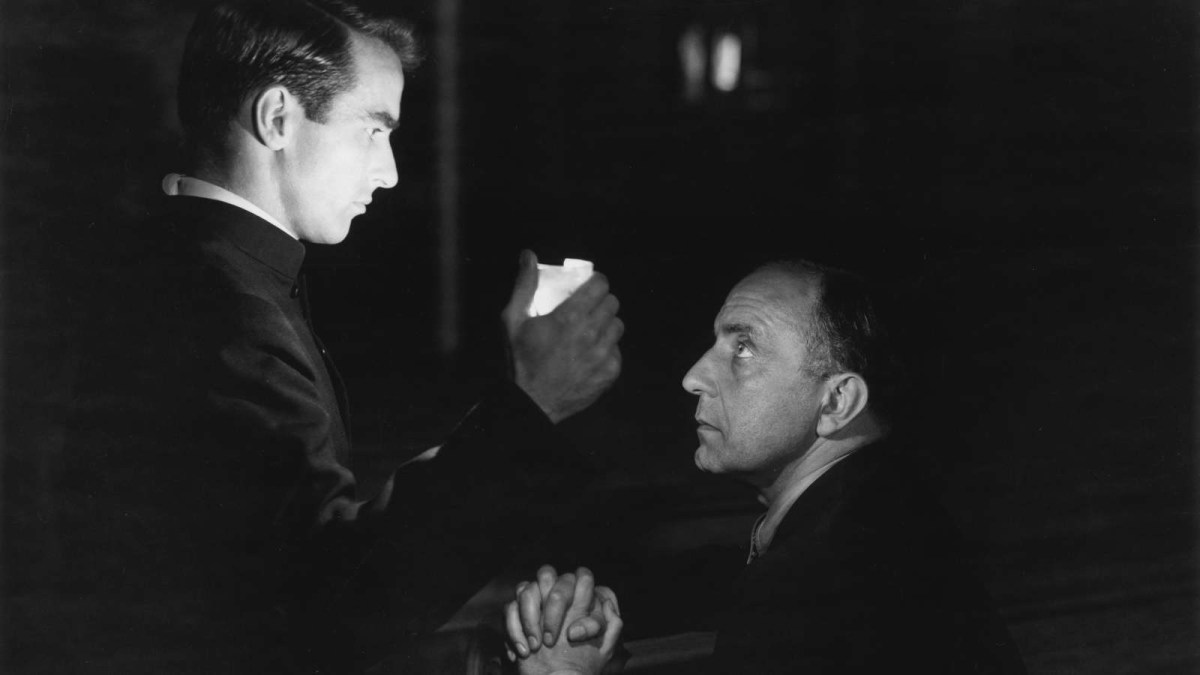Directed by Alfred Hitchcock
Written by George Tabori and William Archibald
By default, I feel like most of Alfred Hitchcock’s work deals with morality and ethics. Perhaps not directly, or head on, but at the very least tangentially. Dealing so often with murder, and the “wrong man” tropes, his films inherently ask the viewer to think on a moral basis. Who is the good guy, who is the bad guy? Murder is assumed to be immoral, and I don’t think Hitchcock ever wavers from that assumption, but with I Confess, he has added a new layer to his storytelling by directly involving moral/ethical questions. In some ways, this makes it experimental for Hitch to do so, but I found it to be a fascinating foray into something we had not previously seen from him, a new layer to the same story he’s told time and again.
Otto Keller (O.E. Hasse) has just come from Vilette’s residence, where he has murdered the lawyer whose garden he tends after attempting to rob him. Upon entering the church where he and his wife Alma (Dolly Haas) are caretakers, he confronts Father Logan (Montgomery Clift), who hears Keller’s confession. Bound by the confines of confession, Logan is unable to expose Keller. But after Inspector Larrue (Karl Malden) begins investigating the suspicious crime, where witnesses saw someone leaving Vilette’s residence the night of the murder wearing Priest’s clothing, Father Logan becomes the prime suspect for the murder. A childhood friend and former lover, Ruth (Anne Baxter) comes in to help clear Father Logan’s name, but will the inspectors believe her story? Will Father Logan remain silent and risk his own freedom when he knows who really murdered Vilette?
One major thing that once again stood out to me were the visuals. I mentioned it in the Strangers on a Train review specifically, and do think Hitchcock’s visual language is maturing to a level of mastery in this era that we will continue to see. He has always included great, interesting imagery in his films, but with I Confess there is a certain level of proficiency that seems prevalent throughout instead of just in flashes. This is a film that reeks of brilliant Noir moments of darks and lights highlighted by impeccable use of shadows with his black and white photography. It will be noteworthy to see how these visual begin to translate as Hitchcock largely transitions to the use of color.
It’s great to see a different angle to the story of murder we’ve seen so many times from Hitchcock. That’s not to say he doesn’t tend to come up with some great twist for each of his stories, but I Confess really feels unique to his other films. By putting the moral dilemma directly into the plot of the film really forces the viewer to contemplate what they’d do in the same circumstance. But by the same token, I think it drags down the film a little bit because we’re constrained by knowing the truth, and knowing the protagonist can do almost nothing about it. Sometimes by constraining the film in this manner, something wholly new, original and fresh can come out of the work, but here, I think Hitchcock is largely on auto-pilot, delivering his well-developed filmmaking, but not much above and beyond.
It’s interesting to track the flight of Hitch’s evolution, and I think at this point, he had had enough master works to be able to say that his auto-pilot was better than almost anyone else’s. And while this critique sounds harsh, I Confess really is an interesting and entertaining film, but it also doesn’t rank anywhere near his best. I couldn’t help but think it could have been so much more, especially given the more than capable cast on hand. Clift is especially good as the conflicted, but ethical Father Logan, and Anne Baxter and Karl Malden are their usual good selves in the other major roles in the film. It’s minor Hitchcock for sure, but presents plenty to chew on for any fan, just don’t expect another master work with this one.

